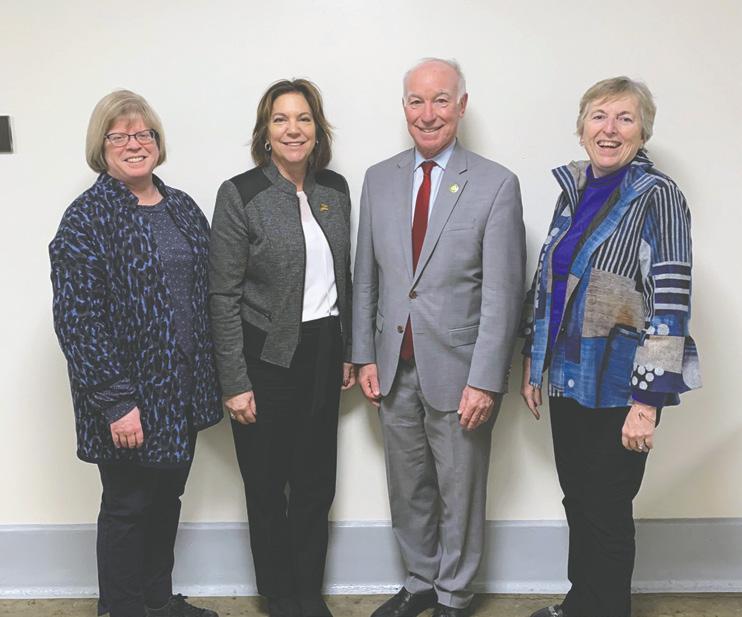
3 minute read
Connecticut’s FOIA PARTICIPATION AT MEETINGS: What is (and May Soon Be) Required Under the FOIA?
Mark J. Sommaruga, Esq. Pullman & Comley, LLC
I am often asked questions concerning public participation at board meetings, in light of the Connecticut’s Freedom of Information Act’s (“FOIA”) meeting requirements. Here are some helpful pointers as to what is currently required, along with a possible change on the horizon.
Advertisement
What is the General Rule for Public Attendance at Board Meetings?
It goes without saying that the public has a right to attend all meetings of public agencies covered by the FOIA (except for executive sessions where the public can be properly excluded). An agency can remove persons who willfully interrupt a meeting so as to render the orderly conduct of the meeting unfeasible, but these are rare circumstances, with removal being a last resort.
What About “Sign In” Sheets?
A public agency (including boards of education) must permit any member of the public to attend meetings without being required to register by name, furnish information of any kind, complete a questionnaire, or fulfill any other condition before entering the meeting place. While an agency may have a sign-in sheet for persons attending (or speaking) at a meeting, the agency cannot then prevent members of the public who refuse to provide their names from attending the meeting. Arguably, a sign-in sheet is permissible as a condition for speaking at a meeting. In speaking of speaking …
What About Public Comments?
While the FOIA gives the public the right to be present at meetings, Connecticut’s Freedom of Information Commission (“FOIC”) has repeatedly ruled that nothing in the FOIA gives members of the public the right to speak at a meeting. A public agency’s determination as to whether to permit public comments at its meetings is governed by other legal and policy considerations (for example, a board policy or even a local ordinance requiring them) but is not a matter that currently concerns the FOIC.
Cautionary Notes (If You Do Have Public Comments):
An agency does NOT violate the FOIA (or even the Constitution) by not allowing public comments. However, if public comment or “audience of citizens” periods are provided for, a board can limit public comment to specific topics (for example, agenda items) pursuant to a board policy or bylaw.
In addition, a board can generally have content neutral time, place and manner restrictions (such as a time limits for speakers and requiring decorum/order).
However, a board cannot limit such comments in a viewpoint restrictive manner. With respect to complaints against employees, a board can redirect members of the public to complaint resolution policies, but likely cannot prohibit such discussion during public comments (unless the board restricts topics to agenda items).
What About Remote/ Hybrid Meetings?
The FOIA provides that members of the public remotely attending a remote or hybrid meeting must be provided with the same opportunity to provide comment and participate in the meeting that they would be accorded if they attended the meeting in-person. Conversely, boards are NOT required to offer persons remotely attending a meeting the opportunity for comment if comment is not also offered to (or required by law for) persons attending in-person.
Should My Board Have a Policy Governing Public Comments?
The short answer is YES. Such a policy can address many of the issues discussed above, including when and where to have public comment periods (for example, at just regular meetings or special meetings as well), whether comments are limited to the agenda items at the meeting or can be on any topic, time limits for individual speakers and the comment period in general, whether public comments are limited to residents, any sign-up requirement, and general rules of
decorum. Which leads to …
Might Things Change in the Future?
During its current (2023) regular session, the Connecticut General Assembly is considering House Bill 5796 (“An Act Requiring Public Comment Periods at Public Agency Meetings”).
As the title suggests, the bill would amend the FOIA so as to require public agencies – including boards of education -- to have public comment periods at all of their meetings.
As currently written, the bill would not distinguish between (and would require public comment periods at both) regular and special meetings. Interestingly, the bill would only amend the FOIA to the extent that it would require public agencies to provide members of the public an opportunity to present oral testimony on any items appearing on the agenda for such meeting during a designated public comment period. The bill further provides that agencies could adopt rules and restrictions regarding public comment periods, including, but not limited to, a limit on the total amount of time allocated for public comment on specific agenda items and for each individual speaker.
As of the date of the writing of this article, this bill is before the General Assembly’s Planning and Development Committee. There is no guarantee that it will become law (as currently written or amended). Stay tuned, as boards of education may further need to revise their policies on public comments if this bill — or some version of it — becomes law.
Attorney Sommaruga is the author of “Understanding Connecticut’s Freedom of Information Act” (5th Edition 2018).








